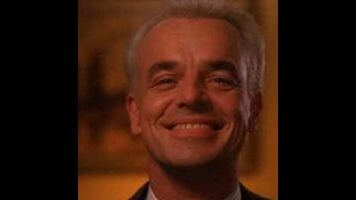Twin Peaks: "Episode 15" / "Episode 16"

"Episode 15"
So now we know. Where do we go from here? That's the question dogging Twin Peaks in Episode 15, an entry that answers it with a defiant "nowhere." But nowhere can be an okay destination, especially since any attempt to top last week's big revelation would inevitably feel like a letdown. So instead we get an episode of simmering tension and ominous notes. The atmosphere doesn't survive into Episode 16, but it works extremely well here.
A lot of the credit belongs to Ray Wise, whose spookily moving turn as Laura's grief-crippled father/murderer reaches a bizarre apotheosis here. Where previously it was mostly clear when Leland was in control and when Bob was pulling the strings, Maddie's murder has apparently led to an accord between the personalities. Leland can goof around with golf clubs and dance his way through the Great Northern and Bob is ready to match him step for step.
Speaking of golf, has it ever seemed as sinister as in this episode? Scratch that. Has it ever seemed sinister apart from this episode? Poor Maddie spends the episode riding around in Leland's golf bag–how she fits in there we never find out and I don't think we'd want to know–and then there's the bizarre scene where Leland offers to show Cooper his new clubs only to pose menacingly behind him, seemingly poised to strike. Coop's called away before we see if Leland was prepared to club him or if it was just a stance he assumed. Has he gone Bob to the point where he's comfortable killing a man in broad daylight by the side of the road with witnesses all around him? We'll never know.
Wise plays Leland as a man split almost directly down the middle. On one side a poor, tortured soul. On the other, the face of evil. He's the perfect Lynch villain: Malevolence masquerading as All-American Normality, but without the pathos Wise brings to the role he would seem a much thinner creation.
Leland dominates this episode so thoroughly that it's easy to forget there's more to it. We also get a weird, but welcome, flash of young Jerry and Ben remembering their bespectacled sexual awakening watching a friend dance on a rug. (Is this the series' only flashback? It's the only one I can remember.) Elsewhere Shelly and Bobby squabble over taking care of Leo, a fight that doesn't prevent one from eating Leo's spilled (disgorged?) food off the other. Yuck. Lucy's sister shows up. She's played by veteran character actor Kathleen Wilhoite, most recently seen playing Luke's sister on Gilmore Girls. (A side note: Peaks has a mostly timeless look to it but David Patrick Kelly and Wilhoite's hairstyles scream 1990.)
Also, Jane Greer shows up for a three-episode run as Norma's mom. Greer, who still looks striking here, was the female lead in the great Jacques Tourneur noir Out Of The Past, another tale of darkness finding its way into a small town.
Grade: A-
"Episode 16"
Despite the premature revelation of Laura's killer, this is the first episode that really feels rushed, even tacked on. It starts well, with the lawmen and a freshly returned Albert looking grim as they discuss Maddie's death. We even get a little bit of a Wild Bunch walking-in-slow-motion shot, courtesy of director Tim Hunter. But from there the rush is on as Coop and a newly enlisted Donna talk about Laura's diary then Donna ends up in jeopardy at the Palmers' house. Then we're back to the roadhouse and some Red Room flashbacks and Cooper gets the ring back and it all feels like a bit of a jumble. Also, this is a show filled with strange people but even in the Twin Peaks universe would Horne hire Leland to defend him against the charge of killing Leland's daughter?
Maybe. I don't know what bugs me about the way this episode works. It feels like the careless handling of what ought to be a major moment, especially compared to Episode 14's revelation and the atmospheric episode between Leland's unmasking and his arrest and death. But there's still a lot here that works, even if we're again stuck listening to Andy talking about his "sperms" too much. "That gum you like is going to come back in style," remains an endlessly quotable line and Palmer's death scene is well handled with, again, some superb Ray Wise acting. "I was just a boy," he says, recalling his first encounter with Bob. "He said he wanted to play." And while I fully accept that Twin Peaks wants us to buy into its woodsy-mystico mythology of good and evil, I like that Wise plays it as if it might be all in his head to the end.
The clumsy final shot, however, insists that it's not. Bob's loose in the world again and due to make trouble, even if his continued presence in Twin Peaks doesn't really make that much sense. But then a lot of stuff to come doesn't make that much sense, does it?
Next up: The mysteries of Pittsburgh.
Grade: B-